When two veteran New York filmmakers — married producer-financier Dan Cogan and producer-director Liz Garbus — launched Story Syndicate in 2019, Cogan transitioned from daily management of Impact Partners (Oscar-winning “Icarus” and “The Cove”) to join forces with Garbus (Emmy-winning and Oscar-nominated “What Happened Miss Simone?”) with one big idea in mind: to create a Brooklyn headquarters for multiple filmmakers to create documentary series, features, shorts, and podcasts.
In doing so, the duo anticipated a burgeoning market for non-fiction. They saw that documentaries had evolved beyond cinéma vérité to more structured and entertaining narratives as HBO, A&E, Netflix, Showtime, Apple, Amazon, CNN, MTV, and more popularized the form. But Cogan and Garbus didn’t expect to be a crucial supplier during the Commercial Age for documentaries, and they were shocked at how swiftly the landscape changed.
“It turned out that the company is growing much, much faster than we anticipated,” said Cogan during an interview with IndieWire at the Telluride Film Festival alongside Garbus. “Right now, we have 21 projects between development and things about to go into release, including the three things that are here. And we projected that we would have half of that. It’s not just about us, it’s the way the industry is growing. Every new streamer keeps wanting to make non-fiction films and non-fiction series. It has become an accepted part of the entertainment industry. When we were coming up, we never expected to be in the mainstream of what big entertainment companies were buying.”
The debuting Telluride trio were two NatGeo Oscar-contender biodocs, Garbus’ “Becoming Cousteau” (October 22, Picturehouse/November 24, Disney+) and John Hoffman and Janet Tobias’ “Fauci” (September 2, Magnolia, October 2, Disney+), as well as HBO’s three-part documentary series “Nuclear Family,” a personal narrative from filmmaker Ry Russo-Young (“Before I Fall”). The three projects followed very different trajectories that show the many ways Story Syndicate supports its filmmakers.
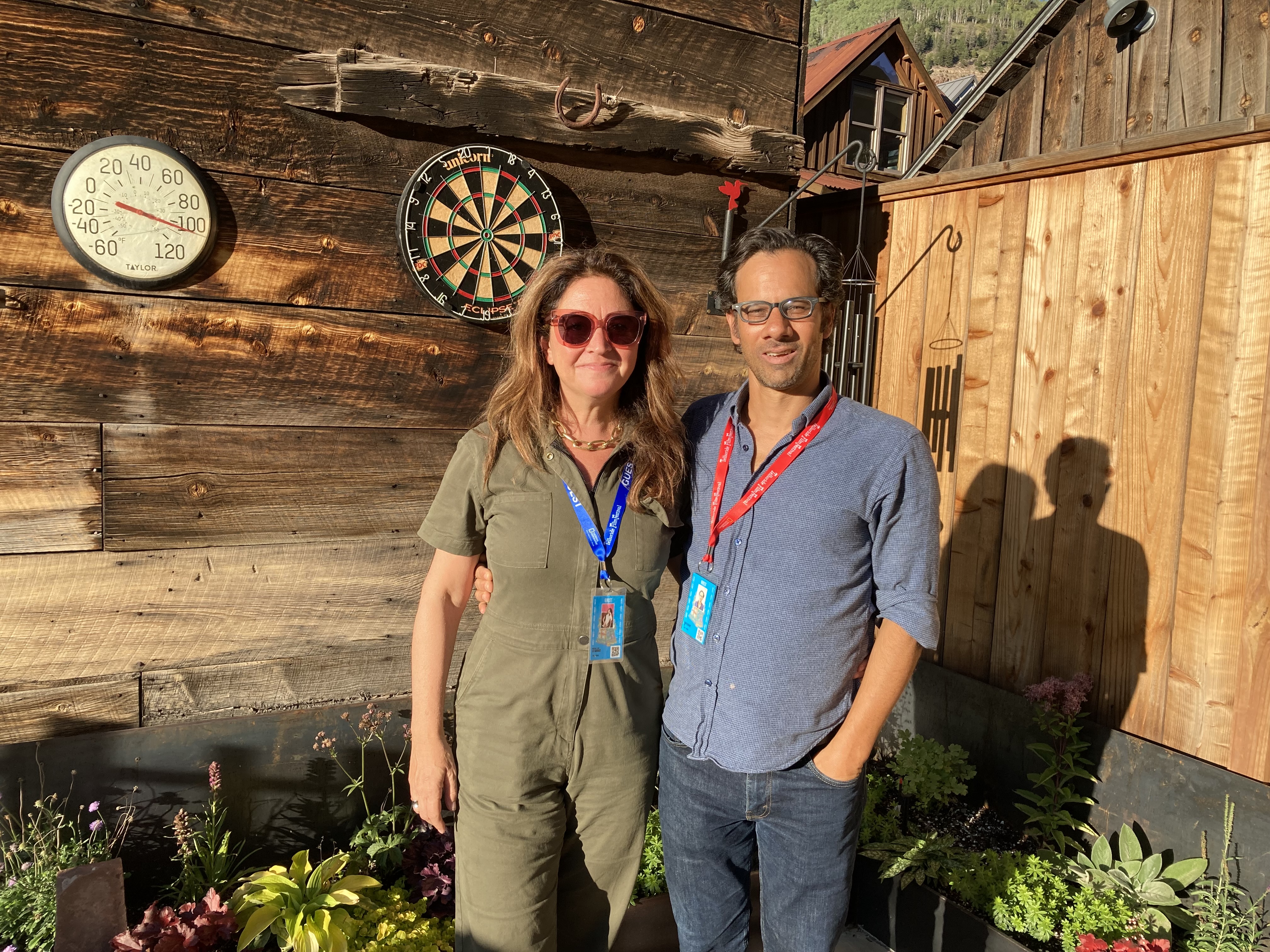
Story Syndicate chiefs Liz Garbus and Dan Cogan at Telluride
Anne Thompson
Clearly, Garbus is the company’s brand-name filmmaker. She is sent many more projects to helm than she can possibly take on. While she is maintaining her legendary workaholic standards, she’s enjoying being able to find homes for projects that she can’t direct, while still keeping her hand on the tiller. “And it stays in house,” she said. “Oftentimes, they will trust that that we’ll make sure it’s as good as as it could be. And so for me, it’s been actually a wonderful thing. I’ve actually been able to change my own workflow, I can direct my one film that I’m directing, and produce others, and have that stimulation.”
“Becoming Cousteau” is a film she generated herself after reading a book about Jacques-Yves Cousteau to her son. She realized that his generation did no longer knew about the red-capped captain of the Calypso, who became an iconic figure over his 50-year career from the ’40s through the ’90s. She fashions a definitive portrait of the Oscar-winning French underseas explorer, TV star, and documentary filmmaker that reveals complex layers of his life and career over decades, both personal and political, that nobody ever appreciated, not even his own family. For one thing, he was a gifted filmmaker who evolved from grabbing funding from oil companies to passionate environmentalist.
Garbus and her team not only digitized and viewed hours of footage from multiple sources, but edited together an entertaining movie without resorting to talking heads. French actor Vincent Cassel provides the voice of the sea voyager by reading his letters, while Garbus also conducted audio interviews. “If you have 500 hours of footage shot by Jacques Cousteau and Louis Malle and this merry band of bikini-clad men on the Calypso,” said Garbus, “who the hell am I to put a camera on a tripod and go to a living room and talk to somebody? You just want your eyes on Cousteau’s footage.”
Having covered celebrity subjects and their estates before, including Marilyn Monroe and Nina Simone, Garbus was prepared to navigate warring interests, but this one proved to be a challenge. “There’s often a lot of fighting for who controls the legacy,” she said. “My job is essentially to be Switzerland, and I’m trying to make this film about this man and his legacy, and I want to hear all of it. But I need to find my way through that story.”
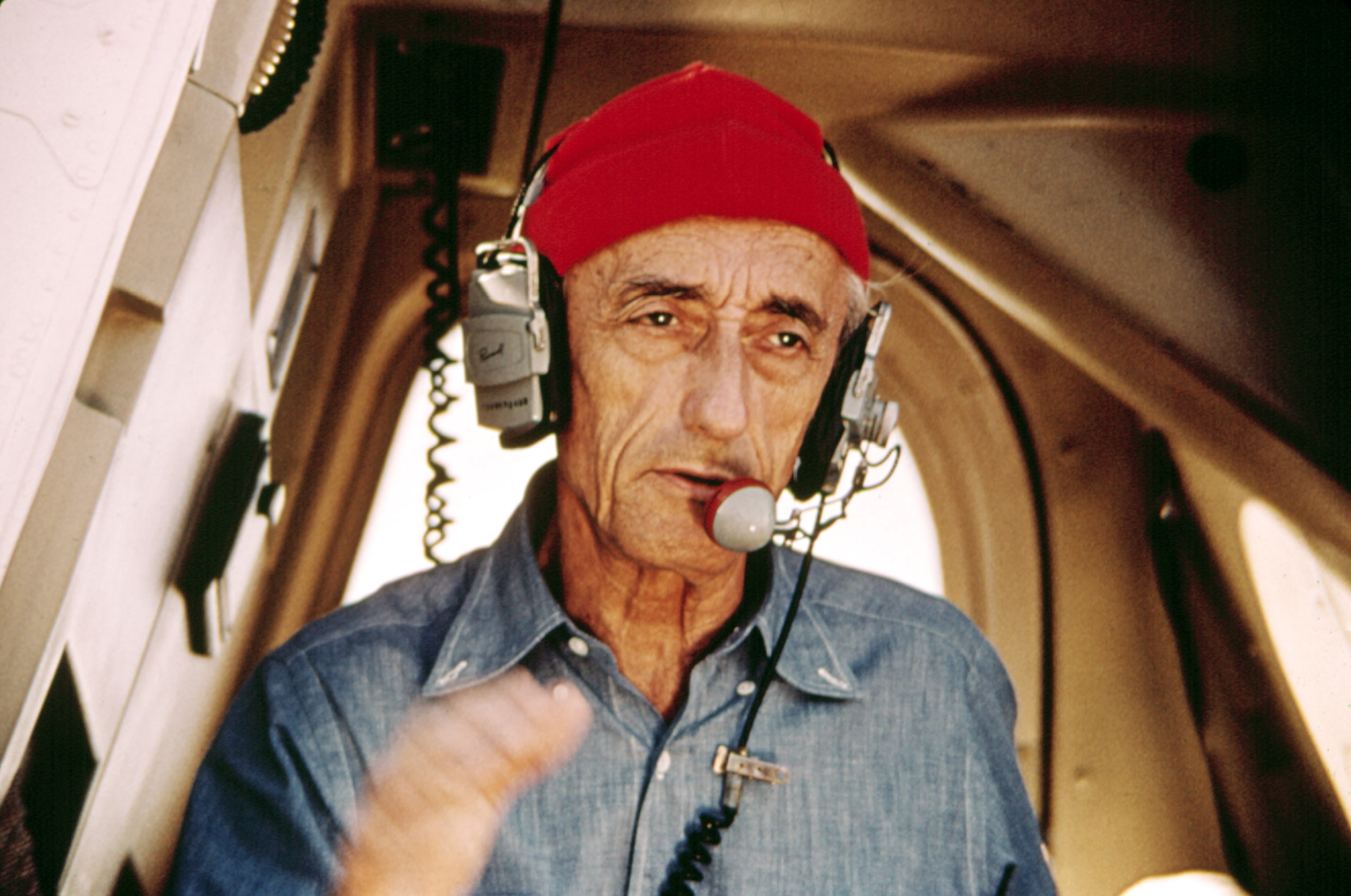
Jacques Cousteau
©United Artists/Courtesy Everett Collection
When Garbus decided to tell the Cousteau story through the lens of the planet’s environmental crisis, she approached NatGeo, which controlled some footage and became a valuable ally. “We knew to make this film special we needed all of this other footage that was only controlled by the Cousteau Society,” she said. After four years of negotiations, and with NatGeo solidly behind her, Garbus finally landed their cooperation. “We go in, we’re not going to make a movie unless we have editorial control,” said Cogan. “We’re not going to give control to a subject in a movie. And we’ve lost projects that were big projects because of that.”
When the Cousteau family kept asking Garbus what story she was telling, demanding to see a script, Cogan told them, “You know, Liz doesn’t make documentaries from scripts. The visual material is going to speak to Liz and tell her what is the most interesting story to tell. That was a tension in the relationship: they want us to tell them what the film’s gonna be, and we have no fucking idea.”
Cogan describes the current non-fiction landscape as the corporate age of documentary. “People want control of films which promote their brand,” said Garbus. “I want to make films about my heroes, and I’m happy to bring their brand back if it’s valid, but only through my own lens. And there have been a lot of films that have come our way that we won’t do if the subject hasn’t signed off. The most interesting thing about producing: ‘how do you get these two circles into that spot in the Venn diagram where they overlap?’ One is making great films that you believe in as cinema stories, and one is relating to the commercial landscape.”
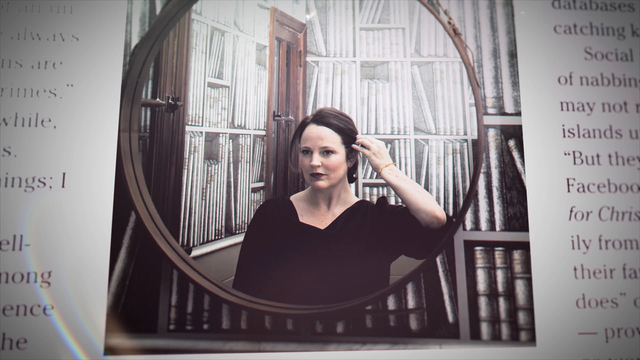
Michelle McNamara in “I’ll Be Gone in the Dark”
HBO
One new area for Garbus has been expanding into television. For HBO’s true crime six-episode limited series “I’ll Be Gone in the Dark,” based on the best-selling book by Michelle McNamara, Story Syndicate brought in three other directors to work alongside her, as well as four editors and a lead producer. “Everybody just came with the skill set,” said Garbus. “It was a beautiful symphony: certain people had extraordinary visual skill sets or extraordinary story skill sets, and then all of us got together in the room.”
The director got a kick out of eyeballing the whiteboard and moving around the story pieces, she said, “and being able to empower people to try stuff.” She credits HBO doc czar Sheila Nevins with teaching her early on the power of experimentation and being willing to fail. “I just love Michelle’s story and her voice and being able to tell it over the course of six hours. It was obviously deeply disturbing and dark, but from a collaborative point of view really satisfying.”
During production, Story Syndicate elevated a producer they believed in, Elizabeth Wolfe, to direct. “Liz can’t make all those episodes herself,” said Cogan. “We, as a company, can say we believe in [Wolfe], and HBO was willing to trust us. She was an extraordinary additive as a director, and now we’re producing her next film that will be her first feature that she’s gonna direct herself.”
Another first was Garbus’ first narrative scripted film, Netflix’s “Lost Girls,” starring Amy Ryan, Thomasin McKenzie, and Gabriel Byrne, a true murder mystery set on Long Island. “There are stories that are going to be told in a non-fiction form and stories that may be a better told in a scripted form like ‘Lost Girls,'” said Garbus. “I didn’t want to make a documentary; there was no footage. It would be just with people talking about these crimes. It was all too past tense and too many people were gone. I couldn’t have made that as a documentary. And there are other projects like that as well.”
Garbus followed up by directing the season finale of “Handmaid’s Tale,” for which she was nominated for an Emmy. Up next, she doesn’t know if she will be making a scripted film or a documentary. It could go either way.
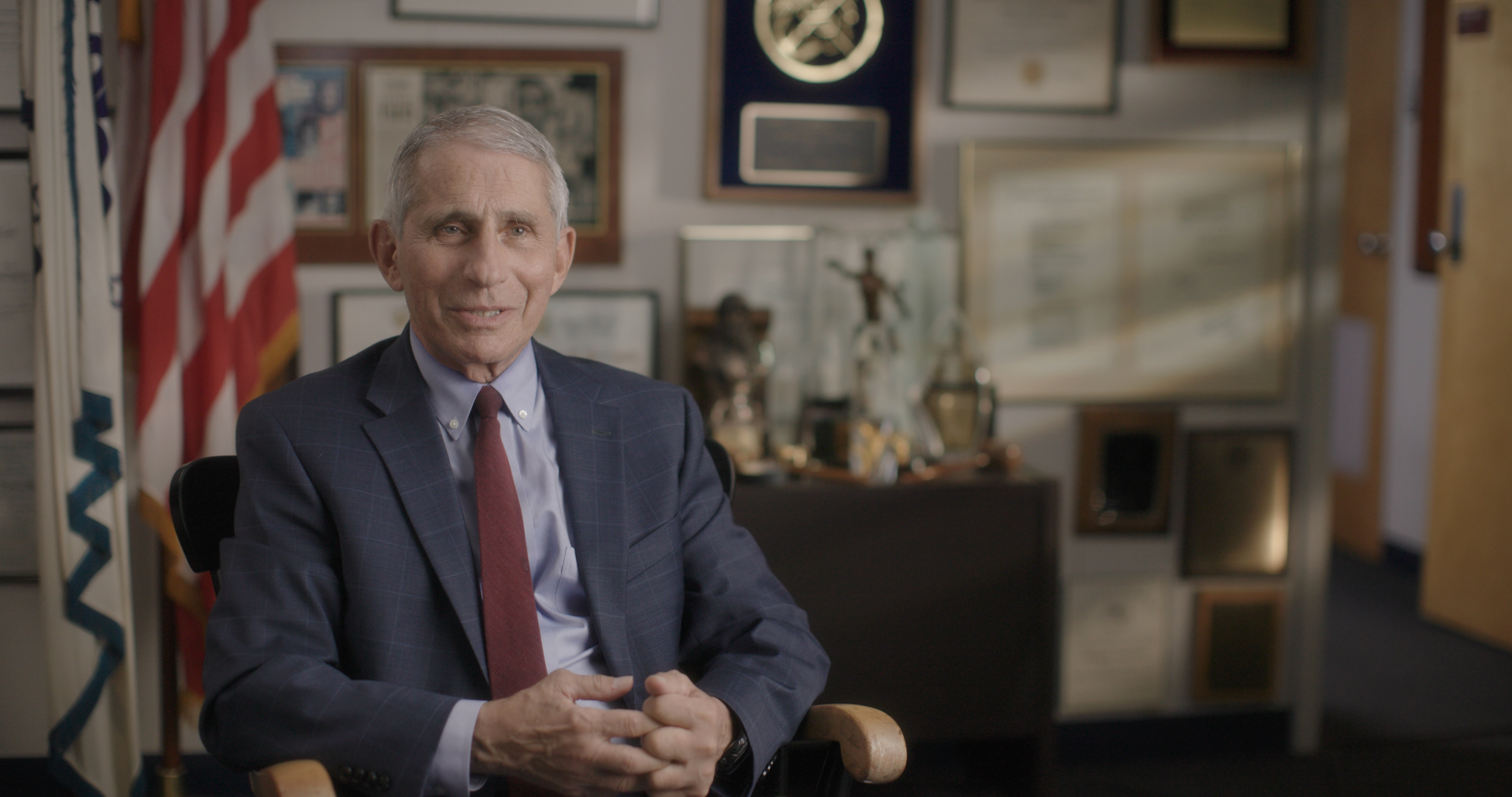
Dr. Anthony Fauci in seated interview in his office at the National Institute of Allergy and Infectious Diseases
National Geographic for Disney+
“Fauci” came about when Story Syndicate creative head John Bardin brought up the idea of chasing down a biopic on Anthony Fauci, the high-profile National Institute of Health infectious diseases director and the Chief Medical Advisor to the President, one that revealed his prior fraught battle with AIDs activists. Bardin brought in John Hoffman who, having made many films at the NIH, had that institutional relationship.
Then they discovered that Janet Tobias was already making a film with Fauci about the 20-year search for an AIDS vaccine. “There are these two pandemics and there is this incredible book-ending of a career,” said Cogan. “And so we went to [Fauci] with that and luckily he was supportive. Without Janet’s relationship with Tony, we wouldn’t have had the access to him emotionally.”
Even though the two filmmakers had never worked together, they forged an unusually intimate and frank relationship with Fauci, who openly cries on camera, and steered clear of hagiography. “We were very conscious that we could not to do that,” said Garbus. “But how can we not be rooting for him?”
For his part, Cogan helps filmmakers to navigate the business side and “empower them to fight for what they already know is right,” said Garbus. “They already know, but they have to find their voice. Dan can hear what the network is wanting or expecting, and then hear what the filmmaker thinks they’re making. And when those two things aren’t the same? You need to deal with that early with filmmakers who are at early or beginning stages of their career, which is gonna save a lot of pain later. Not all these filmmakers are young, some people are less comfortable dealing with the business aspect, wonderful filmmakers, but not able to necessarily negotiate those trajectories.”
And Cogan believes in confrontation, when necessary. “Many people in the industry want to bury problems, so they don’t come up,” he said. “And they then fester, explode, and create bad dynamics. So if there is a problem, I will share it early. And either we’re going to get over it, or the project isn’t going to happen. People have to be on the same page wanting to make the same thing. And if we can do that, if we can establish that early and there’s trust in us, than we can deliver something great.”
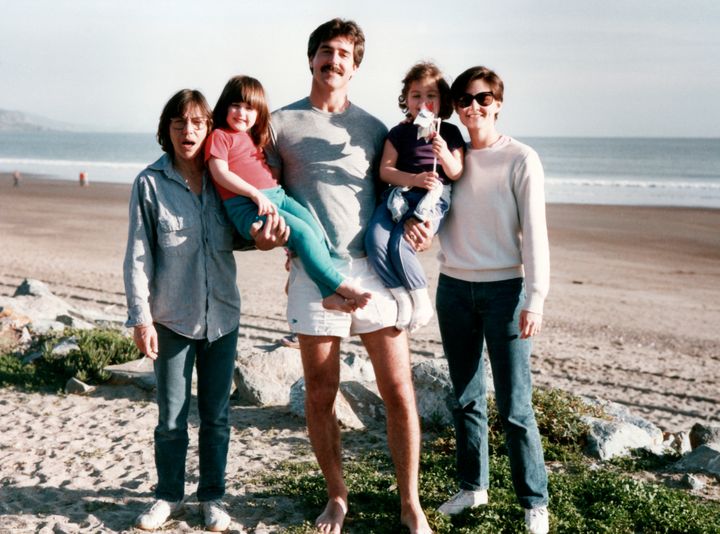
“Nuclear Family”
HBO Documentary Films
When Story Syndicate looked at Ry Russo-Young’s video pitch for the story of her two lesbian moms and her gay dad, they wanted to help her make her first documentary feature. “The epic human drama of that story was just so extraordinary,” said Cogan. “And that was a case where we knew we could never sell that to a platform, because Ry had not made a doc before. It would be very hard before we’d actually made the film for it to feel as big and epic as it is. It would feel like a small LGBTQ story. We would never get financing. So that was a case where we went out to equity investors who cared about this subject. And we were able to pull together a small budget to make a feature and when we saw her first rough cut, it was two and a half hours long. And none of us thought we could cut anything.”
That’s when Cogan went to the investors, Impact Partners, Big Beach and Topic Studios, and convinced them to put in more money for a three-part series. “Everyone said, ‘we’re going to double down.’ HBO bought it. And they got it instantly,” he said. “And now we’re working with [Russo-Young] to develop it as a scripted series. And she has another film feature that she wants to do based on a character who’s one of the interviewees, and we’re doing that together, too. So it’s growing from non-scripted to scripted.”
The good news, despite many corporate demands, is that the rules around non-fiction and fiction have never been so flexible. “It’s so freeing,” said Garbus.
“We have a project right now for FX that we set up that we’re doing as a five-part documentary series,” said Cogan, “and the doc is serving as development for a scripted series. As we’re building and growing in non-fiction and growing in fiction, we’re looking right now to hire someone to run scripted for us at a high level. The goal of the company is to get to a place with scripted that we are in non-fiction, where we’re making premium scripted material that has true story sources that is as emotional and powerful as the non-fiction that we make.”
And in order to best serve their filmmakers, Story Syndicate has stayed independent. While they’ve had offers of exclusive deals, they’ve turned them down. “It’s important to us to find the right home for the film,” said Cogan. “It has to be the place that loves it, that believes in it, that understands what that thing is that they and we want. That’s not always the case. We’ve been around a while, so we know that there’s something more important than money, and that’s freedom and independence to make the things that you want to make. That gives you a certain kind of power.”
In doing so, the duo anticipated a burgeoning market for non-fiction. They saw that documentaries had evolved beyond cinéma vérité to more structured and entertaining narratives as HBO, A&E, Netflix, Showtime, Apple, Amazon, CNN, MTV, and more popularized the form. But Cogan and Garbus didn’t expect to be a crucial supplier during the Commercial Age for documentaries, and they were shocked at how swiftly the landscape changed.
“It turned out that the company is growing much, much faster than we anticipated,” said Cogan during an interview with IndieWire at the Telluride Film Festival alongside Garbus. “Right now, we have 21 projects between development and things about to go into release, including the three things that are here. And we projected that we would have half of that. It’s not just about us, it’s the way the industry is growing. Every new streamer keeps wanting to make non-fiction films and non-fiction series. It has become an accepted part of the entertainment industry. When we were coming up, we never expected to be in the mainstream of what big entertainment companies were buying.”
The debuting Telluride trio were two NatGeo Oscar-contender biodocs, Garbus’ “Becoming Cousteau” (October 22, Picturehouse/November 24, Disney+) and John Hoffman and Janet Tobias’ “Fauci” (September 2, Magnolia, October 2, Disney+), as well as HBO’s three-part documentary series “Nuclear Family,” a personal narrative from filmmaker Ry Russo-Young (“Before I Fall”). The three projects followed very different trajectories that show the many ways Story Syndicate supports its filmmakers.

Story Syndicate chiefs Liz Garbus and Dan Cogan at Telluride
Anne Thompson
“Becoming Cousteau”
Clearly, Garbus is the company’s brand-name filmmaker. She is sent many more projects to helm than she can possibly take on. While she is maintaining her legendary workaholic standards, she’s enjoying being able to find homes for projects that she can’t direct, while still keeping her hand on the tiller. “And it stays in house,” she said. “Oftentimes, they will trust that that we’ll make sure it’s as good as as it could be. And so for me, it’s been actually a wonderful thing. I’ve actually been able to change my own workflow, I can direct my one film that I’m directing, and produce others, and have that stimulation.”
“Becoming Cousteau” is a film she generated herself after reading a book about Jacques-Yves Cousteau to her son. She realized that his generation did no longer knew about the red-capped captain of the Calypso, who became an iconic figure over his 50-year career from the ’40s through the ’90s. She fashions a definitive portrait of the Oscar-winning French underseas explorer, TV star, and documentary filmmaker that reveals complex layers of his life and career over decades, both personal and political, that nobody ever appreciated, not even his own family. For one thing, he was a gifted filmmaker who evolved from grabbing funding from oil companies to passionate environmentalist.
Garbus and her team not only digitized and viewed hours of footage from multiple sources, but edited together an entertaining movie without resorting to talking heads. French actor Vincent Cassel provides the voice of the sea voyager by reading his letters, while Garbus also conducted audio interviews. “If you have 500 hours of footage shot by Jacques Cousteau and Louis Malle and this merry band of bikini-clad men on the Calypso,” said Garbus, “who the hell am I to put a camera on a tripod and go to a living room and talk to somebody? You just want your eyes on Cousteau’s footage.”
Having covered celebrity subjects and their estates before, including Marilyn Monroe and Nina Simone, Garbus was prepared to navigate warring interests, but this one proved to be a challenge. “There’s often a lot of fighting for who controls the legacy,” she said. “My job is essentially to be Switzerland, and I’m trying to make this film about this man and his legacy, and I want to hear all of it. But I need to find my way through that story.”

Jacques Cousteau
©United Artists/Courtesy Everett Collection
When Garbus decided to tell the Cousteau story through the lens of the planet’s environmental crisis, she approached NatGeo, which controlled some footage and became a valuable ally. “We knew to make this film special we needed all of this other footage that was only controlled by the Cousteau Society,” she said. After four years of negotiations, and with NatGeo solidly behind her, Garbus finally landed their cooperation. “We go in, we’re not going to make a movie unless we have editorial control,” said Cogan. “We’re not going to give control to a subject in a movie. And we’ve lost projects that were big projects because of that.”
When the Cousteau family kept asking Garbus what story she was telling, demanding to see a script, Cogan told them, “You know, Liz doesn’t make documentaries from scripts. The visual material is going to speak to Liz and tell her what is the most interesting story to tell. That was a tension in the relationship: they want us to tell them what the film’s gonna be, and we have no fucking idea.”
Cogan describes the current non-fiction landscape as the corporate age of documentary. “People want control of films which promote their brand,” said Garbus. “I want to make films about my heroes, and I’m happy to bring their brand back if it’s valid, but only through my own lens. And there have been a lot of films that have come our way that we won’t do if the subject hasn’t signed off. The most interesting thing about producing: ‘how do you get these two circles into that spot in the Venn diagram where they overlap?’ One is making great films that you believe in as cinema stories, and one is relating to the commercial landscape.”

Michelle McNamara in “I’ll Be Gone in the Dark”
HBO
“I’ll Be Gone in the Dark”
One new area for Garbus has been expanding into television. For HBO’s true crime six-episode limited series “I’ll Be Gone in the Dark,” based on the best-selling book by Michelle McNamara, Story Syndicate brought in three other directors to work alongside her, as well as four editors and a lead producer. “Everybody just came with the skill set,” said Garbus. “It was a beautiful symphony: certain people had extraordinary visual skill sets or extraordinary story skill sets, and then all of us got together in the room.”
The director got a kick out of eyeballing the whiteboard and moving around the story pieces, she said, “and being able to empower people to try stuff.” She credits HBO doc czar Sheila Nevins with teaching her early on the power of experimentation and being willing to fail. “I just love Michelle’s story and her voice and being able to tell it over the course of six hours. It was obviously deeply disturbing and dark, but from a collaborative point of view really satisfying.”
During production, Story Syndicate elevated a producer they believed in, Elizabeth Wolfe, to direct. “Liz can’t make all those episodes herself,” said Cogan. “We, as a company, can say we believe in [Wolfe], and HBO was willing to trust us. She was an extraordinary additive as a director, and now we’re producing her next film that will be her first feature that she’s gonna direct herself.”
Another first was Garbus’ first narrative scripted film, Netflix’s “Lost Girls,” starring Amy Ryan, Thomasin McKenzie, and Gabriel Byrne, a true murder mystery set on Long Island. “There are stories that are going to be told in a non-fiction form and stories that may be a better told in a scripted form like ‘Lost Girls,'” said Garbus. “I didn’t want to make a documentary; there was no footage. It would be just with people talking about these crimes. It was all too past tense and too many people were gone. I couldn’t have made that as a documentary. And there are other projects like that as well.”
Garbus followed up by directing the season finale of “Handmaid’s Tale,” for which she was nominated for an Emmy. Up next, she doesn’t know if she will be making a scripted film or a documentary. It could go either way.

Dr. Anthony Fauci in seated interview in his office at the National Institute of Allergy and Infectious Diseases
National Geographic for Disney+
“Fauci”
“Fauci” came about when Story Syndicate creative head John Bardin brought up the idea of chasing down a biopic on Anthony Fauci, the high-profile National Institute of Health infectious diseases director and the Chief Medical Advisor to the President, one that revealed his prior fraught battle with AIDs activists. Bardin brought in John Hoffman who, having made many films at the NIH, had that institutional relationship.
Then they discovered that Janet Tobias was already making a film with Fauci about the 20-year search for an AIDS vaccine. “There are these two pandemics and there is this incredible book-ending of a career,” said Cogan. “And so we went to [Fauci] with that and luckily he was supportive. Without Janet’s relationship with Tony, we wouldn’t have had the access to him emotionally.”
Even though the two filmmakers had never worked together, they forged an unusually intimate and frank relationship with Fauci, who openly cries on camera, and steered clear of hagiography. “We were very conscious that we could not to do that,” said Garbus. “But how can we not be rooting for him?”
For his part, Cogan helps filmmakers to navigate the business side and “empower them to fight for what they already know is right,” said Garbus. “They already know, but they have to find their voice. Dan can hear what the network is wanting or expecting, and then hear what the filmmaker thinks they’re making. And when those two things aren’t the same? You need to deal with that early with filmmakers who are at early or beginning stages of their career, which is gonna save a lot of pain later. Not all these filmmakers are young, some people are less comfortable dealing with the business aspect, wonderful filmmakers, but not able to necessarily negotiate those trajectories.”
And Cogan believes in confrontation, when necessary. “Many people in the industry want to bury problems, so they don’t come up,” he said. “And they then fester, explode, and create bad dynamics. So if there is a problem, I will share it early. And either we’re going to get over it, or the project isn’t going to happen. People have to be on the same page wanting to make the same thing. And if we can do that, if we can establish that early and there’s trust in us, than we can deliver something great.”

“Nuclear Family”
HBO Documentary Films
“Nuclear Family”
When Story Syndicate looked at Ry Russo-Young’s video pitch for the story of her two lesbian moms and her gay dad, they wanted to help her make her first documentary feature. “The epic human drama of that story was just so extraordinary,” said Cogan. “And that was a case where we knew we could never sell that to a platform, because Ry had not made a doc before. It would be very hard before we’d actually made the film for it to feel as big and epic as it is. It would feel like a small LGBTQ story. We would never get financing. So that was a case where we went out to equity investors who cared about this subject. And we were able to pull together a small budget to make a feature and when we saw her first rough cut, it was two and a half hours long. And none of us thought we could cut anything.”
That’s when Cogan went to the investors, Impact Partners, Big Beach and Topic Studios, and convinced them to put in more money for a three-part series. “Everyone said, ‘we’re going to double down.’ HBO bought it. And they got it instantly,” he said. “And now we’re working with [Russo-Young] to develop it as a scripted series. And she has another film feature that she wants to do based on a character who’s one of the interviewees, and we’re doing that together, too. So it’s growing from non-scripted to scripted.”
The good news, despite many corporate demands, is that the rules around non-fiction and fiction have never been so flexible. “It’s so freeing,” said Garbus.
“We have a project right now for FX that we set up that we’re doing as a five-part documentary series,” said Cogan, “and the doc is serving as development for a scripted series. As we’re building and growing in non-fiction and growing in fiction, we’re looking right now to hire someone to run scripted for us at a high level. The goal of the company is to get to a place with scripted that we are in non-fiction, where we’re making premium scripted material that has true story sources that is as emotional and powerful as the non-fiction that we make.”
And in order to best serve their filmmakers, Story Syndicate has stayed independent. While they’ve had offers of exclusive deals, they’ve turned them down. “It’s important to us to find the right home for the film,” said Cogan. “It has to be the place that loves it, that believes in it, that understands what that thing is that they and we want. That’s not always the case. We’ve been around a while, so we know that there’s something more important than money, and that’s freedom and independence to make the things that you want to make. That gives you a certain kind of power.”


